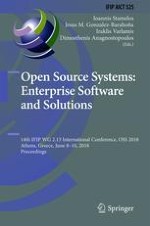2018 | Buch | 1. Auflage
Open Source Systems: Enterprise Software and Solutions
14th IFIP WG 2.13 International Conference, OSS 2018, Athens, Greece, June 8-10, 2018, Proceedings
herausgegeben von: Ioannis Stamelos, Jesus M. Gonzalez-Barahoña, Iraklis Varlamis, Prof. Dimosthenis Anagnostopoulos
Verlag: Springer International Publishing
Buchreihe : IFIP Advances in Information and Communication Technology
